 Petzlover
Petzlover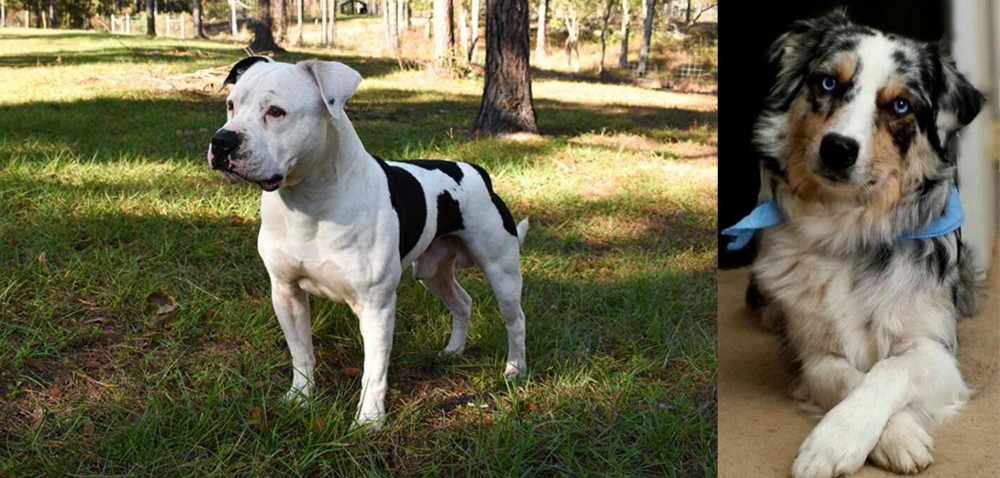 American Bulldog is originated from United States but Australian Collie is originated from Australia. American Bulldog may grow 30 cm / 12 inches higher than Australian Collie. American Bulldog may weigh 29 kg / 64 pounds more than Australian Collie. Both American Bulldog and Australian Collie has almost same life span. American Bulldog may have more litter size than Australian Collie. American Bulldog requires Low Maintenance. But Australian Collie requires Moderate Maintenance
American Bulldog is originated from United States but Australian Collie is originated from Australia. American Bulldog may grow 30 cm / 12 inches higher than Australian Collie. American Bulldog may weigh 29 kg / 64 pounds more than Australian Collie. Both American Bulldog and Australian Collie has almost same life span. American Bulldog may have more litter size than Australian Collie. American Bulldog requires Low Maintenance. But Australian Collie requires Moderate Maintenance
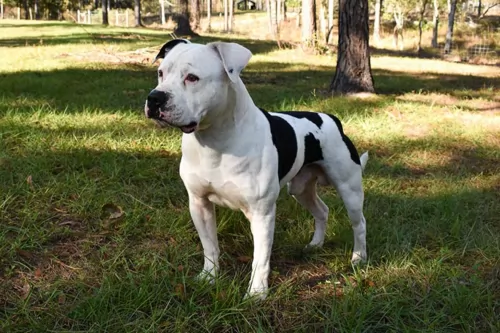 Following World War II, the American Bulldog was almost extinct.
Following World War II, the American Bulldog was almost extinct.
Thanks to John D. Johnson from Summerville, Georgia the breed is still with us today. He gathered the best dogs he could find throughout the rural South and bred them back into popularity among his family and other rural families. His father bred the American Bulldog before John did and they have bred them longer than any other in any part of the world. His dogs were regularly used for tracking, hunting, guarding, watchdog and weight pulling. At some point Alan Scott joined Johnson breeding other bulldogs to Johnson's and forming the Standard American Bulldog.
The American Bulldog/ is popular today as a family pet and companion as well as a working dog.
 The Koolie, as a breed we know today, originates from Australia. But, before they were breed and imported, they were the mix made of Britain smooth coated blue merle Collie and the Black and Tan Collie from the Highlands of Scotland. The Koolie came to Australia to work as a kennel dog since they are known as the working, farm dog that can adapt to any weather condition. They were bred to be agile and non-aggressive quiet herding dogs, and they have kept most of those good characteristics until today.
The Koolie, as a breed we know today, originates from Australia. But, before they were breed and imported, they were the mix made of Britain smooth coated blue merle Collie and the Black and Tan Collie from the Highlands of Scotland. The Koolie came to Australia to work as a kennel dog since they are known as the working, farm dog that can adapt to any weather condition. They were bred to be agile and non-aggressive quiet herding dogs, and they have kept most of those good characteristics until today.
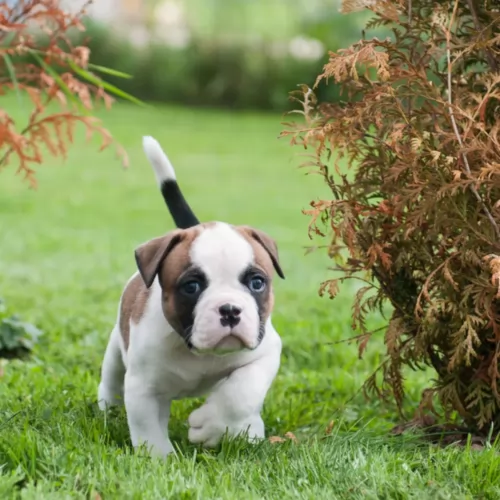 The American Bulldog is a powerful and muscular dog in a sturdy and compact frame. The female is more refined than the heavy boned and stocky male, but both genders are athletic, agile and quick. The have large heads, strong jaws, a muscular neck and with a moderately deep and wide chest.
The American Bulldog is a powerful and muscular dog in a sturdy and compact frame. The female is more refined than the heavy boned and stocky male, but both genders are athletic, agile and quick. The have large heads, strong jaws, a muscular neck and with a moderately deep and wide chest.
They have a square head, with muscular cheeks and a clearly defined furrow between his eyes. With broad, square and strong muzzles, they have a reverse scissors, scissors, moderate underbite and an even bite. Ears come in a variety of shapes and sizes and eyes can be any color as well. The nose however should be black and lips black as well. Their legs are strong, heavy boned and straight with well-defined muscles in the hindquarters. Finally ,they have a thick, low set tail that comes to a point at the end.
 Koolie is a medium bred. Their head is small, with a pointy jaw. Ears are pricked, semi-dropped or dropped. Their coat can be smooth or rough, short or medium length, always with the undercoat. The colours can be Red or Blue Merle, solid Red or Black, sometimes with minimal white or cream speckles. They are usually two-coloured or tricoloured, but some of them are actually one-coloured.
Koolie is a medium bred. Their head is small, with a pointy jaw. Ears are pricked, semi-dropped or dropped. Their coat can be smooth or rough, short or medium length, always with the undercoat. The colours can be Red or Blue Merle, solid Red or Black, sometimes with minimal white or cream speckles. They are usually two-coloured or tricoloured, but some of them are actually one-coloured.
Some Koolie have one or two blue, green or yellow eyes. Eye colour is, of course, affected by the gene that creates the coat pattern and eye colour as well.
They are athletic dogs, with fine bone structure but great stamina. Actually, they were breed to be like that – to work hard, be noticeable among the sheep, eat little and be loyal to one person.
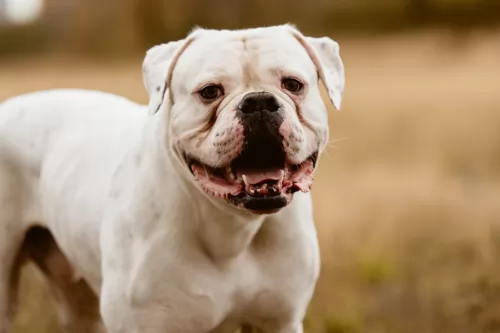 The American Bulldog is characteristically loyal, brave and reliable. It is a friendly, gentle dog that truly loves children. There is not a hostile bone in his body despite his history and reputation for bull baiting. Though he is protective of its family and affectionate with most, he still needs a human companion who is strong willed and a genuine pack leader. Without this he might become aggressive around other dogs and pets. They are immensely self-confident and they do slobber and drool and will become excited and hard to handle without daily exercise of both their body and their minds.
The American Bulldog is characteristically loyal, brave and reliable. It is a friendly, gentle dog that truly loves children. There is not a hostile bone in his body despite his history and reputation for bull baiting. Though he is protective of its family and affectionate with most, he still needs a human companion who is strong willed and a genuine pack leader. Without this he might become aggressive around other dogs and pets. They are immensely self-confident and they do slobber and drool and will become excited and hard to handle without daily exercise of both their body and their minds.
 Koolie is naturally energetic, playful and affectionate so they are naturally very good to raise with children.
Koolie is naturally energetic, playful and affectionate so they are naturally very good to raise with children.
They are known as great obedience dog. They are very famous as the tracking dogs.
Some of them are successful as the rescue dogs, therapy dogs or educators for school children.
This is not a type of dog that will be alone in the house, wait for you and then be quiet while you rest. They need a great deal of activity and they are not such great choice for indoor life anyways. The best thing for them would be the large yard, with somebody home most of the time. They are great if raised in a family, with children and active owners. They will be great for a loner at the farm as well since that is in their blood. They need enough place to run, chase, play, rest on the sun and be active as they please. They get affectionate towards their families, but they will be accepting their new home when they are older just fine.
They are very good at learning. Intelligent, yes, but yet very silly and playful to do what is told all the time. They will surprise you with how quickly they will pick up the new trick but not feeling like doing it every time you would like them to. Everything is a play for them, so it would be best if you know how to play, be affectionate and friendly to become a good owner of this breed.
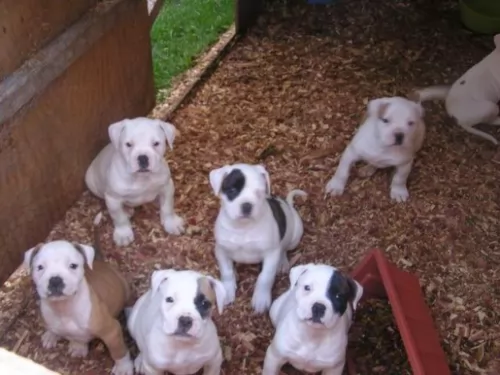 Though generally healthy, the American Bulldog is prone to a few problems.
Though generally healthy, the American Bulldog is prone to a few problems.
This is a serious issue in many breeds of dogs and is especially prevalent with the American Bull Dog. This may seem ironic in such a short legged dog but it is unfortunately very common. It is a genetic disorder that causes the bones in the joint to separate and causes the dog much pain and lameness.
Due to skin folds you need to be care and watch for irritation and infection in the folds. They are also prone to ear infections.
The American Bulldog is prone to overeating and all the health issues that presents. With short legs and a genetic predisposition to arthritis and hip dysplasia, obesity is a real health risk for your bulldog.
 If you are careful enough, you will choose your Koolie form patiently chosen breeders, after checking the health history of the pup and the pup’s family. Advisable is to do these things in person and never to buy a Koolie from a pet shop.
If you are careful enough, you will choose your Koolie form patiently chosen breeders, after checking the health history of the pup and the pup’s family. Advisable is to do these things in person and never to buy a Koolie from a pet shop.
Sometimes, pups can be born blind or deaf pups. They have the great chance of joint problems because of their extreme activity. Their need to run, jump and play all the time may result in damage to cartilage and ligaments, especially since they are not aware of their age most of the time.
There is a chance that pup has skin allergies or immune system issues if they are growing on a farm near the chemicals used for plants, so be careful what kind of herbicide you use if you have a Collie.
In some rare cases, they suffer from seizers. If untreated, they can cause death. If you decide to take him to a regular vet check, you will have a happy and playful life together.
 Whether you choose canned food or dry food, treats as biscuits or left-overs, the quantity is the safest way of keeping the balanced diet for your Collie. They like raw meat and raw bones. Make sure not to feed them with cooked bones because they can do more harm than good.
Whether you choose canned food or dry food, treats as biscuits or left-overs, the quantity is the safest way of keeping the balanced diet for your Collie. They like raw meat and raw bones. Make sure not to feed them with cooked bones because they can do more harm than good.
Since Koolie coat can be very short with the undercoat or a bit longer with undercoat, bristle brushing every 3 or 4 days will be enough for them. Some of them like the water and some of them don’t and that is perfectly fine since there is no need for a regular bath.
Lots of activities and lots of love. They express their love all the time and you can learn a lot from them actually. They like raw bones and from-the-table delicious treats but make sure not to overfeed them.
Games that need them to be fast and think quickly. Running with them, driving a bike with them (but not on the leash!) would be a great fun for them. Why not leash? They are so playful and happy and they tend to jump and run to the side to chase a butterfly or catch the falling leaf.